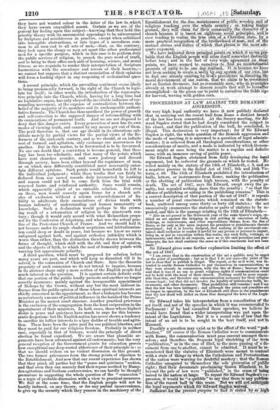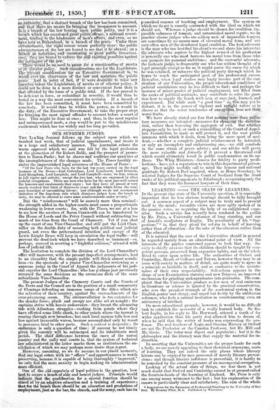PROCEEDINGS AT LAW AGAINST THE ROMANIST- AGGRESSION.
On very high legal onaority we have it now publicly declared that in carrying out the recent hull from Rome a distinct breach of the law has been committed. At the Surrey meeting, Sir Ed- ward Sugden stated that he had deeply considered the subject in his closet,. and that the publication of the- bull, he concluded, is illegal. This declaration is very important; for if Sir Edward Sugden is right, the whole question of the Romish aggression and the mode of meeting it is narrowed to a question of legal adminis- tration; it is relieved from all theological considerations, or ether considerations of merits, and a mode is indieated.by which Govern- ment might at once bring the matter to a regular and definite issuer with an immense saving of public Sir Edward Sugden abstained from fully developing the legal argument, but he indicated the grounds on which he rested, lie relied mainly on the statute of the 13th of Elizabeth, e. 2, and en a negative proviso in the Relief Act of 1847, 9th and 1.00) Vic- toria, c. 59. The 13th of Elizabeth prohibited the introduction of bulls, letters, or instruments from Rome, making the publication or the abetting of publication high treason, with the penalty of death. The act of 1847, says Sir Edward, swept away the pe- nalty, but repealed nothing more than the penalty ; "so that the offence of publishing or aiding in the publishing remains." This is a correct description of that portion of the act of 1847: it repeals a number of penal enactments which remained on the statute- book, scattered among some thirty or forty old statutes ; the act successively enumerates the statutes or parts of statutes to be re- pealed, and this is the passage relating to the 13th of Elizabeth— ",Also an act passed in the thirteenth year of the same Queen's reign, en- titled an act against the bringing in and putting in execution of bulls, writings, or instruments, said other superstitious things, froin the See of Rome, so far only as the same imposes the penalties or punishinents therein mentioned : but it is hereby declared, that nothing in the enactment con- tained shall authorize or render it lawful for any person or persons to import, bring in, or put in execution within this realm any such bulls, writings, or instruments, and that in all respects, save as to the said penalties and pun- ishnients, the law shall continue the same as if this enactment bad not been
made."
Sir Edward gives some further explanation limiting the effect of the act of 1847.
"I am aware that in the construction of the act a quibble maybe urged on the point of punishment; but as to that I do not care—the point of the law is clear that to publish is illegal. The repeal, so far as it went, was in- tended to enable Roman Catholics to put themselves in communication, as they were already in communion, with the See of Items; because it was said that it was of no use to grant religious rights if communication could not be held with the head of their church. Nothing could be more reason- able than this, and therefore any communication necessary for their religion became legal ; but that did not involve the legality of introducing bulls, in- struments, and other documents. That prohibition still remains; 'and r say that the law has been infringed ; and although the pains and penalties are no longer in operation, by the law of Vli7abeth still there is the punishment that the law itself will inflict on those that disregard the laws of the Legis- lature."
Sir Edward takes his interpretation from a consultation of ' the act itself, and not of the speeches in which it was recommended to Parliament: if he had consulted those speeches, we believe he would have found that a wider interpretation was put upon the intent of the Legislature. But it is a sound rule of law that the intent of an act is to be sought in the text itself, and not in Hansard.
Possibly a question may exist as to the effect of the word "pub- lication." Of course if the Roman Catholics were to communicate with Rome, the conununication must pass current amongst them- selves ; and therefore the frequent legal stretching of the term "publication," as in the case of libel, to the mere passing of a do- cument from one to another, cannot be admitted. It must be re- membered that the statutes of Elizabeth were meant to contend with a state of things in which the Catholicism and Protestantism of the nation were warring- for doubtful mastery ; that the Homan Catholics arrogated to themselves the sole possession of public right ; that their documents proclaiming Queen Elizabeth to be beyond the pale of law were "published," in the sense of being issued to the nation at Jorge. To repeat Sir Edward Sugden's ex- pression, it would be "a quibble" to say that there is any publics- don of the recent bull in this sense. But we will not antietate the legal arguments which Sir Edward Sugden waived..
Sufficient for the present purpose to find it stated by so high
4rihat a distinct breach of the law has been committed, al thre- are means for bringing the trespassers to account. li'breach of the law bearing upon public polity, and it is a vhieh has occasioned great public offence, a national resent-
o men's a ' i4d4ien, as we , perfee y'elear: the public
r breach of 014 l!reder these administmt f the lair are .mind. to see that it -‘6, dbeleo ; 9,11a sifr
■ so' gre Ito ' Rd& eiffbieb • entiltfes against
'b iewe e t to tr Md. .W13166061 iise for a caneideration of Merits ')ifleardivS flnsidcratIons nit or the Legikititure. ee,9b Cid:infer an Exectiti* (lovernmeet,' 1St' Id
:.tketOR` WTI it &Ike of the lie+ 'the' Maintain the"eittblie
peace. A. Si& of fact, if it '1w clesiiible to rAsieliti, question b '{he Legislature, of merits or of ulterior, policy; it could not be dale in a more distinct or convenient form than in that afforded by the issue of a public trial. If the law proved to be deficient in force, or redundant in severity, it would thus be tested.* a way the most convenient for revision If a breach of the law has been committed, it :must have been committed by somebody. It would thus be within the power, as it would be the deity, of the Executive Government, to take the proper steps for bringing the most signal offender to account before a court of law. This might be done at once; and thus, in the most regular and unimpassioned mode, a stop would be put to the mischievous excitement which has too widely and too long prevailed.



























 Previous page
Previous page